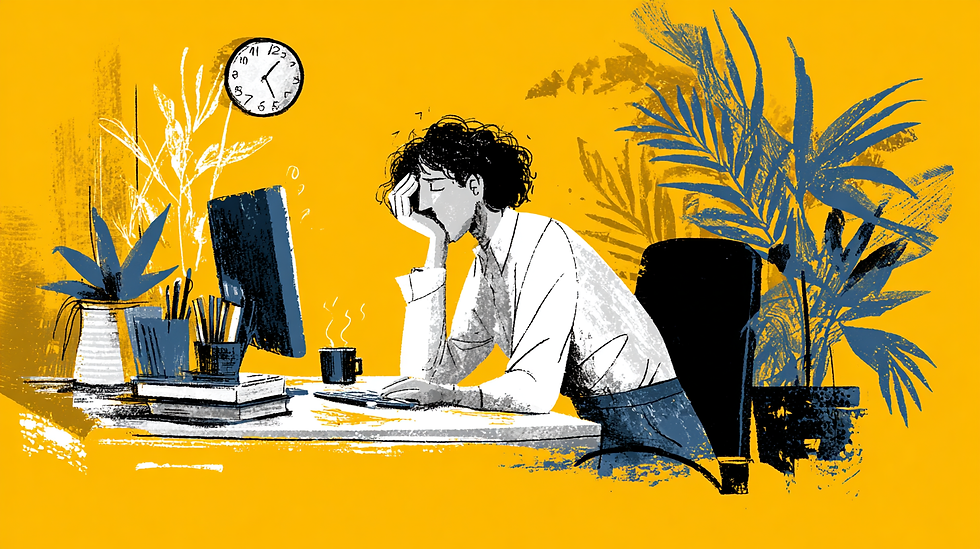Can’t Focus, Can’t Clock Out Mentally: Is It Burnout or Depression?
- Goodwin Health Cafe
- Jul 22, 2025
- 3 min read

You’re staring at the screen—again. There’s a to-do list a mile long, Slack messages piling up, and somewhere in the middle of it all, you realize you haven’t really felt anything all day. You're not just tired. You’re checked out. But is it just workplace burnout? Or could it be something deeper—something like depression?
For many professionals, especially in high-pressure or emotionally demanding roles, this question comes up more often than you might think. The tricky part is, burnout and depression in the workplace share a lot of symptoms. That foggy mental state? Could be either. The creeping sense of detachment? Also both. So how can you tell the difference—and why does it matter?
Let’s take a closer look.
What Is Burnout, Really?
Burnout is a response to chronic workplace stress. It’s not a medical diagnosis, but it is a recognized occupational phenomenon by the World Health Organization. It often shows up in three key ways:
Emotional exhaustion: You feel drained and depleted, even after a full night’s sleep.
Cynicism and detachment: Tasks that used to excite you now feel pointless or frustrating.
Reduced performance: You’re working harder, but the results just aren’t there—and you can’t focus the way you used to.
Burnout can stem from long hours, unclear job expectations, toxic workplace culture, or even a mismatch between your values and the organization’s. While it’s deeply uncomfortable, burnout typically gets better when you take a break, shift roles, or adjust your environment.
But what happens when none of that helps?
When Burnout Looks Like Depression in The Workplace
Burnout and depression can look eerily similar. Both can make you feel numb, hopeless, and disinterested in things you once cared about. But depression in the workplace goes beyond job stress—it’s a medical condition that affects how you think, feel, and function, on and off the clock.
Here are a few signs your experience may be more than burnout:
The feelings don’t go away, even when you’re off workIf weekends, vacations, or job changes don’t offer relief, it might be depression.
There’s a deep sense of hopelessness or worthlessnessWhile burnout is frustration with your job, depression can feel like a blanket of despair covering everything.
Physical symptoms appearChronic fatigue, appetite changes, sleep disruptions, and unexplained aches can all point to clinical depression.
You lose interest in more than just workWhen depression sets in, even hobbies, relationships, and self-care can feel like too much.
If this sounds familiar, know this: You are not broken. And you are not alone.
Why This Matters (And What You Can Do)
Depression isn’t just a personal issue—it’s a workplace issue. According to the National Institute of Mental Health, depression is one of the leading causes of lost work productivity and disability in the U.S. Still, stigma and confusion often prevent people from seeking help.
Here’s the good news: Treatment works. At Goodwin Health Cafe, we specialize in compassionate, evidence-based care that meets people where they are. If you’re dealing with depression in the workplace, we offer services tailored to both the emotional and biological roots of depression—including Transcranial Magnetic Stimulation (TMS), talk therapy, medication management, and more.
We’ve worked with professionals from every walk of life—nurses, teachers, engineers, creatives—who once thought they were “just burned out,” only to discover their symptoms were part of a larger mental health picture. And once they got the right kind of support, they began to feel like themselves again.
When to Reach Out
If you’ve been asking yourself:
Why can’t I focus anymore?
Why do I feel so disconnected from my job—and my life?
Why doesn’t rest actually help?
Then it’s time to talk to someone.
Mental health is not a luxury. It’s foundational. And whether your next step is talking to your doctor, exploring therapy, or learning more about TMS for treatment-resistant depression, taking any step toward clarity is an act of strength.
A Final Thought
The line between burnout and depression can be thin—but the difference in how they’re treated is profound. Don’t wait for things to get worse. There’s help. And healing is possible.
If you or someone you care about is struggling with depression in the workplace, our team at Goodwin Health Cafe is here to help.
Goodwin Health Cafe | Treatment-Resistant DepressionLocated at: 5625 N Wall St suite 100, Spokane, WA 99205, USAVisit our website to learn more about how we support professionals and individuals navigating complex emotional challenges.






Comments